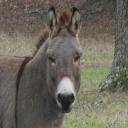Yahoo Answers is shutting down on May 4th, 2021 (Eastern Time) and beginning April 20th, 2021 (Eastern Time) the Yahoo Answers website will be in read-only mode. There will be no changes to other Yahoo properties or services, or your Yahoo account. You can find more information about the Yahoo Answers shutdown and how to download your data on this help page.
Trending News
How important is turnout to a horse's health?
I have a young mare, and I feel that she does not get turned out enough. She gets turned out for about 2 hours per day. I'm trying to convince my mom to let me go to a barn that is a little farther away, with much better turnout. What is somethings that would be a benefit for this, and what are some affects a horse could get from not being turned out enough?
8 Answers
- Anonymous1 decade agoFavorite Answer
Turnout is extremely important and there are tons of affects that can come from not getting enough.
A major one is colic. The less turnout, the higher the risk. There's tons of information and research out there on it. Colic is expensive, turnout is not.
Hoof issues. Lower limb circulation is facilitated by the pumping action of the vein system between the sole and the coffin bone. Standing in a stall does not provide this and poor hoof growth is virtually assured and it increases the risk of virtually all other hoof problems.
Behavioral problems. Stalled horses are more likely to develop stereotypies and be high strung and harder to train. A horse in a stall doesn't get normal social interaction that they need and stalls are too far removed from their natural way of life. How would your mom like to spend 22 hours a day in a cubicle? and she's not even adapted to plains life.
Those are the primary ones that come to mind but do some searching and you'll find some more. The natural horsemanship sites have some good information about the pros of turnout.
- BarefoottrimmerLv 71 decade ago
Aside from nutrition, there is nothing more important than turn out. Your horse needs to have an opportunity to be a horse and have a horsey life. Horses are not meant to live in a box. It causes behavioral problems like cribbing, and weaving, chewing and biting. Also standing in a stall is very hard on a horse's feet and legs and body overall. A stalled horse will have much more joint and arthritis than a horse who is allowed to be out in the pasture. 24/7 turnout would be optimum if ever possible. Socialization with other horses is also necessry for a healthy balanced horse, psychologically speaking. She should have at least one pasture buddy if she can't be turned out with a herd. Living in a stall will make your horse miserable. Think about it. This is not a difficult matter to understand. Hope you can get the change, for your horse's sake.
- PRSLv 61 decade ago
Turn out is all important. Horses that get large amounts of turnout into proper enclosures do not develop stable vices (which are caused by stress and boredom). They also have fewer incidences of colic, founder and ulcers. 2 hours a day is not enough, 8-12 hours a day would be better. Pasture board with a run in shed would be perfect. Horses are simply not meant to be confined in a 12x12 space.
- 1 decade ago
2 hours is no where near enough. first off, expect stocking in your horse eventually. A serious leg issue which will cost you ride time and vet bills. Next there is vices, cribbing, weaving, chewing, etc. are mostly born from stalled horses who are in way too long. Third issue is weight gain and bloating or balloning shape to the horse. Easily fixed with riding though. Fourth is when the horse does get out in the pasture its excitement and pent up energy make it way more prone to accidents. Fifth is the most common issue if the horse is in an enclosed barn or center isle type barn, lung issues. Constant dust, dirt, urine, feces, etc. can take their toll over months and years. They can also upset the eyes and nose. Sixth most common issue is thrush and hoof illness from standing in feces and urine and then being packed with soiled or wet bedding. This is of all the most common affect.
Horses should be at the VERY least turned out 8 hours a day if not 12-24 hours. If this horse gets more turnout you may notice a very big change in her personality. Calm, patient, and gentle horses could have once been pent up stalled horses. Horses who are turned out for long periods of time also have a less likely hood of getting sick.
Your horse's hoofs may grow quicker when turned out due to the constant stimulation, so watch them.
I would highly recommend changing stables even if the turn out is increase by an hour or two it will make a huge difference. On our farm horses are allowed in their pastures 24/7 if the owner wishes. We've found that horses use to being stalled most of their day suddenly relax and become easier to handle. Though this may take a few weeks for certain horses as they get very excited to get turned out at first for so long.
Again if possible i would switch as soon as I could, especially with a young horse. Benefits to the horse, your wallet, and your own happiness while handling the young horse can all be seriously effected by this little change.
- How do you think about the answers? You can sign in to vote the answer.
- LouiseLv 41 decade ago
Turnout is important. Especially for a younger horse. There are some horses that would rather be in a stall when it rains and there are others that love to stand in the rain (like my horse). It's important though if you have an obese horse (like mine) that they have limited turnout onto grass. My horse was a full time pasture horse up until a month ago because he stated to founder. He's lives in a stall now and she doesn't turn them out when it's raining bad (which I am okay with because his feet are very sensitive and crack on moist ground) and he gets about 4-5 hours turnout (some days 6-7 hours). I was nervous about the limited turnout at first but the owner tells me that they all stand by the fence when it's time to come in, so it's almost like they are asking to come back inside. My horse is not irritable or "fresh" when I ride him with limited turnout, he's just as happy. I think it's most important horses get turned out with other horses, especially if turnout is limited. Horses need to socialize, they are herd animals. Effects of no limited turnout can be horrible. Some horses just get angry (i've seen a few of those- pin their ears back when you walk past the stall), others pace, some kick the walls, cribbing and just random head movement. I make sure my horse gets lots of excersize to be sure he's not full of energy for the night when he's stalled. If my horses didnt have such bad feet or prone to foundering then I would of most likely boarded him elsewhere with all day turnout or pasture board. Good luck.
- wahooLv 71 decade ago
A horse is a grazing, and moving animal, they have to keep moving in order for circulation, digestion and breathing in fresh air.
When spending time in a stall, there is risk of thrush developing and becoming a major cause of lameness.
Cribbing and Weaving can become an issue for bored horses, the cribbers can ingest particles of wood and other foreign objects as well as sucking in air.
A horse needs plenty of exercise by running playing, and moving, which is not easy in a stall.
A horse is also a gregereous animal and needs the companionship of other horses or at least another living breathing being that it can interact with in the pasture
A horse also has to go through the actions of grazing which in a stall can amount to start eating its bedding or worse its poop
In an enclosed area such as a stall and barn, the much needed fresh air, and sunshine are taken away form the horse. Sunshine is so important to an animals coat, physical wellness and mental health.
You might ask your mom how she would like it if she was locked up in her bedroom for 22 hours in a day.
- Anonymous1 decade ago
As others have said, horses that do not get enough turnout are more likely to colic, founder, get ulcers, have behavioral issues, get stall vices (cribbing, weaving, to name a few), and have hoof problems.
Another big down side to a horse being stalled is that that are so much more likely to develop respiratory problems.
My horse is out 24/7 with free choice hay and is only brought in when the weather is too bad.
Good luck moving your horse!
Source(s): Riding / Training Horses Most Of My Life - horamLv 45 years ago
It relies upon on how problematic you artwork them. what is going to you be doing in that hour of driving. maximum horses do only wonderful on hay on my own. If the horse is 5 years old and you're only exhilaration driving too plenty grain probable would not be a stable concept. i'd only persist with hay and pasture for now. desire this facilitates.





